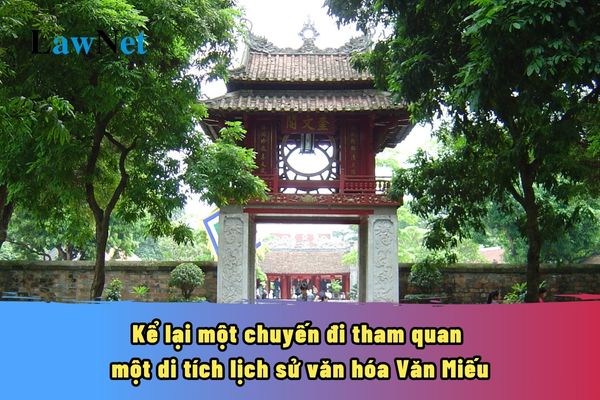What are the sample essays on recounting a visit to the Temple of Literature? What are the rights of 8th-grade students in Vietnam?
What are the sample essays on recounting a visit to the Temple of Literature?
Students can immediately refer to the following sample essays on recounting a visit to the Temple of Literature:
|
Sample essays on recounting a visit to the Temple of Literature A Day Exploring the Temple of Literature On that day, our class was taken by the teachers to visit a very special place, the Temple of Literature. As the bus stopped in front of the gate, my friends and I excitedly stepped off, hearts filled with indescribable emotions. Sample 2 On that day, our class was taken by the teachers to visit a very special place, the Temple of Literature. As the bus stopped in front of the gate, my friends and I excitedly stepped off, hearts filled with indescribable emotions. |
*Note: Information is for reference purposes only./

What are the sample essays on recounting a visit to the Temple of Literature? What are the rights of 8th-grade students in Vietnam? (Image from the Internet)
Do 8th-grade students in Vietnam have the right to participate in activities to develop their talents?
According to Article 35 of the lower secondary school, upper secondary school and multi-level school charter issued by the Ministry of Education and Training in Circular 32/2020/TT-BGDDT, 8th-grade students have several rights as follows:
1. Receive comprehensive education with fairness, be provided with time, facilities, hygiene and safety to learn in class and self-learn at home, be informed of their education and training, and be able to use learning, cultural and sport equipment of their schools as per the law.
2. Receive respect, protection and fair and democratic treatment, complain to their schools and education authorities about decisions concerning themselves; transfer school with legitimate reason as per existing regulations; enter school before the compulsory starting age, skip a grade and study at an age higher than the compulsory attendance age according to regulations in Article 33 of this charter.
3. Participate in activities for development of their gifts in academic subjects, sports and art organized by their schools if able to.
4. Students eligible for social benefits, disadvantaged students and gifted students may receive sponsorship or other benefits as per the law.
5. Transfer school if eligible according to regulations following school transfer procedures stipulated by the Minister of Education and Training.
6. Enjoy other rights as per the law.
Thus, 8th-grade students fully have the right to participate in activities aimed at developing their talents.
What are the required outcomes regarding reading comprehension for 8th-grade students in Vietnam under the Literature curriculum?
Under Section IV of the general education program for Literature issued together with Circular 32/2018/TT-BGDDT, the required outcomes regarding reading comprehension for 8th-grade students in Vietnam under the Literature curriculum are as follows:
READING
READING COMPREHENSION
Literary texts
Reading comprehension of content
- State the overall content of the text; recognize typical details, subject, story, characters in the text’s integrity.
- Recognize and analyze theme, idea, message that the text wishes to convey to the reader through its artistic form; analyze some basis for identifying theme.
- Recognize and analyze the emotions, feelings, and main inspiration of the writer expressed through the text.
Reading comprehension of form
- Recognize and analyze the role of imagination in receiving literary texts.
- Recognize some elements of comic stories, historical stories like: plot, setting, character, language.
- Recognize and analyze single-plot and multiple-plot narratives.
- Recognize and analyze the effect of some key satirical techniques in poetry.
- Recognize some typical elements of octosyllabic quatrain poetry and patho artistic compositions such as: structure, rhyme, law, rhythm, parallelism.
- Recognize and analyze the uniqueness of the poem as expressed through language, images, structure, flow of emotions.
- Recognize and analyze elements of comedy like: conflict, action, character, dialogue, satirical technique.
Relation, comparison, connection
- Understand that each reader can have a personal reception of a literary text; respect and learn from others' receptions.
- Comment on the content reflected and the author's perspective on life and people in the literary text.
- State the changes in personal thoughts, feelings, or lifestyles after reading the literary work.
Extended reading
- In one academic year, read at least 35 literary texts (including texts instructed to read on the Internet) of equivalent genre and length to those studied.
- Memorize some favorite poems or verses in the curriculum.
Argumentative texts
Reading comprehension of content
- Recognize thesis, main points, arguments, and evidence in the text.
- Analyze the relationship between thesis, main points, arguments, and evidence; the role of the main points, arguments, and evidence in conveying thesis.
Reading comprehension of form
Differentiate between objective arguments, verifiable evidence and subjective opinions, evaluations of the writer.
Relation, comparison, connection
Link the content stated in the text with contemporary social issues.
Extended reading
In one academic year, read at least 9 argumentative texts (including texts instructed to read on the Internet) of equivalent length to those studied.
Informational texts
Reading comprehension of content
- Analyze the basic information of the text.
- Analyze the role of details in reflecting the basic information of the text.
Reading comprehension of form
- Recognize and analyze characteristics of some types of informational texts: explaining a natural phenomenon; introducing a book or movie watched; indicating the relationship between text characteristics and its purpose.
- Recognize and analyze how information is presented in the text such as chronological order, cause-effect relationship, degrees of importance, or through comparison and contrast.
Relation, comparison, connection
- Link the information in the text with contemporary social issues.
- Evaluate the expressive effect of a non-verbal means in a specific text.
Extended reading
In one academic year, read at least 18 informational texts (including texts instructed to read on the Internet) of equivalent text type and length to those studied.

